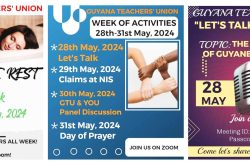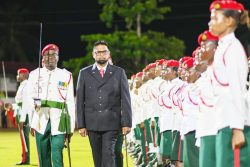Dear Editor,
I am incensed and I take great umbrage with cricket commentary in the Caribbean, and more so, in Guyana. I am very piqued that for quite some time now, the ‘authorities that be’ seem bent on finding ‘pals’ and ‘past players’ to do the job, when real, live cricket commentary demands some exceptional skills. As a caveat, I do not know what obtains with the CPL. It seems as though it is a ‘Trini thing.’ It also appears as if it is not about cricket, but about ‘fan/funfair.’ So, let me address what really is quite upsetting to me.
First, there is no Naim Chan and this boggles the mind. Naim Chan is Guyana’s premier radio cricket commentator, and he may even be so at the regional level. His years of experience, pleasant radio voice, simplicity and correctness of language use and descriptive ability of live play, all combine to make him a natural choice whenever the job has to be done. Naim is ‘true to the action’ on field and he paints a picture for his listeners. He does not commentate as though he is obligated to ‘stir excitement’ when there is none, and there is no ‘urgency to ‘fill’ blank air,’ and thus run into verbosity. These traits, among others, are vital in cricket commentary.
I point employers (NCN in particular) to “How to talk Cricket: On Linguistic Competence in a Subject Matter,” by Andrew Pawley, who asks “What it takes?” and answers: knowledge of English language; excellent verbal communication skills; special grammatical rules; special prosodic or musical patterns; and exceptional fluency, i.e., fewer than average unplanned pauses (among other features).”
Overall, he makes the point that the actual live coverage must be in congruence to the happenings as they unfold. What I have been getting of recent (especially from the Guyanese lot) is shocking. Since my list of complaints will be endless, I will mention a few ‘established irritations,’ and I do not mean mere ‘lapsus linguae.’
For one, the cacologies are just too frequent and numerous. I get so fed-up with defectively produced speech, socially abhorrent enunciation, and nonconformist pronunciation. For example, the number 33 is not ‘torti-tree,’ and the first syllable of ‘to-wards’ does not rhyme with that of ‘co-wards.’ Then ‘Amazon’ is not ‘Amazone’ and ‘Warriors’ is not a rhyming partner of ‘barriers.’
How about the repeated solecism of ‘Guyana ‘is’ and ‘was’ and ‘has’? When Guyana, as a cricket playing unit, has to be the subject of the verb, then the corresponding verb agreement MUST be ‘are,’ ‘were,’ and ‘Have.’ The team, Guyana, functions as a ‘collective plural,’ where pronouns for Guyana become, they (subjective), them (objective) and their (possessive). I can continue to enumerate, but I will now switch to the ‘horror’ listeners are subjected to, and this beats the ‘language crimes’ I just mentioned.
Editor, there seems to be a competition among Andrew Mason, Danny Morrison and Inderjeet Persaud regarding who is the most raucous, strident, tuneless and unmelodious of the lot, with our local boy ‘taking the cake’ by a long stretch. I mean, does ‘toss-spinning’ require a ‘manufactured’ strident piece of coverage? Cricket has more lull-spots than maybe all other on-field sports, yet when this lot are on air, there is a false verbal excitement that is not reflected in what is taking place on the field.
Then there is this ‘lack of flow’ that makes for the coverage coming over as ‘poor reading.’ What was surprising, is that one of those guilty of this, in a PR interview, made mention that he worked alongside the late Tony Cozier. One of the essentials in cricket coverage I mentioned before is that of ‘capturing the game’ in real time, and I add with a vividness that allows listeners to ‘image’ the action.
The constant screaming overuse of hitting a ball ‘high and hard’ is sickening. Every shot in cricket has a name, and so too the strokes/shots played, as well as the position the ball goes to. Then the ‘would have’ phenomenon, popularised by most, if not all of our announcers and parliamentarians, has made an indelible mark on local users of the English language. The stupidity of this construction is obvious, and it leaves me hanging. ‘Would have’ is conditional and speaks of something that has not occurred, and so an explanation should follow. Yet I hear things like “Hetmyer ‘would have’ played for West Indies,” and ‘would have’ captained the West Indies under 19 team, when in fact the man did play and did captain. If he ‘would have ‘played, and ‘would have’ captained, then he did ‘not’ play and did ‘not’ captain. It is so dumb to hear that “They ‘would have’ spun the toss and the Warriors ‘would have’ won and chosen to field. The reality is that the Warriors won the toss and they have chosen to field.
Editor, according to Geoff Boycott, “Too much cricket (is) being played these days and too many retired players (are) joining the fray. From a ‘one commentator,’ we moved to two and now three. And most (are) saying the same thing over and over again.”
According to Richie Benaud and Jim Laker, (commentators should) “… say something that helps their (followers) watching or listening. Try to give the listener or watcher some knowledge or some idea or view that can enhance their viewing or listening. Don’t keep stating the obvious, but that’s what they do a lot … in radio you have to talk more.
You have to draw a picture (but) there’s a lot more talking and babbling on, and if there’s a silence, you’ve got the director in your ear saying “what’s happened, say something.”
My hope is that commentators will realise that their voice quality, mode, pace, cricket insights, and use of language in their presentation, have a great impact on listeners. It can generate enthusiasm, excitement or disappointment, anger, frustration, boredom. Applying all of what I have just written, I hope for some level of change.
Yours truly,
Munesh Dutt






